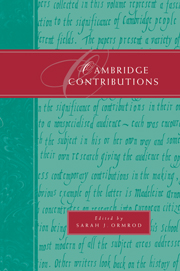Book contents
- Frontmatter
- Contents
- Notes on contributors and contributions
- Preface
- 1 Some Cambridge contributions to astronomy and cosmology
- 2 Cambridge's contribution to medical science
- 3 Cambridge and the study of English
- 4 The Cambridge contribution to economics
- 5 ‘Nasty forward minxes’: Cambridge and the higher education of women
- 6 Cambridge Classics for the third millennium
- 7 Cambridge contributions: the philosophy of science
- 8 European citizenship and education
- 9 The University Botanic Garden
- 10 Geophysics in Cambridge: extinct and active volcanoes
- 11 Cambridge spies: the ‘Magnificent Five’, 1933–1945
7 - Cambridge contributions: the philosophy of science
Published online by Cambridge University Press: 31 December 2009
- Frontmatter
- Contents
- Notes on contributors and contributions
- Preface
- 1 Some Cambridge contributions to astronomy and cosmology
- 2 Cambridge's contribution to medical science
- 3 Cambridge and the study of English
- 4 The Cambridge contribution to economics
- 5 ‘Nasty forward minxes’: Cambridge and the higher education of women
- 6 Cambridge Classics for the third millennium
- 7 Cambridge contributions: the philosophy of science
- 8 European citizenship and education
- 9 The University Botanic Garden
- 10 Geophysics in Cambridge: extinct and active volcanoes
- 11 Cambridge spies: the ‘Magnificent Five’, 1933–1945
Summary
To admit at a cocktail party that one does philosophy of science is a good way to end the conversation. Many people have only the haziest idea what philosophers do and many people think that philosophy and science have nothing to do with each other. So I will begin with some general remarks about the philosophy of science, before turning to the great Cambridge tradition in the subject. Finally, because the only way properly to appreciate philosophy is to worry a philosophical problem for oneself, I will present a puzzle about the way scientists test their theories.
JUSTIFICATION AND DESCRIPTION
What is the philosophy of science? The subject can be seen to emerge from more general areas of philosophy. One of the most important of these is epistemology, the theory of knowledge. The central issues are what knowledge is, how much of it we have, and how we acquire it. Epistemology often proceeds by presenting very negative, destructive arguments, arguments that seem to show that we do not know what we think we know, arguments that seem to show that we know almost nothing. Some of these sceptical arguments are familiar to adults and often reinvented by children. For example, you might worry that the distinctive experiences you have while, say, riding a bicycle, could in fact be experiences that you are having in the comfort of your bed.
- Type
- Chapter
- Information
- Cambridge Contributions , pp. 122 - 142Publisher: Cambridge University PressPrint publication year: 1998



